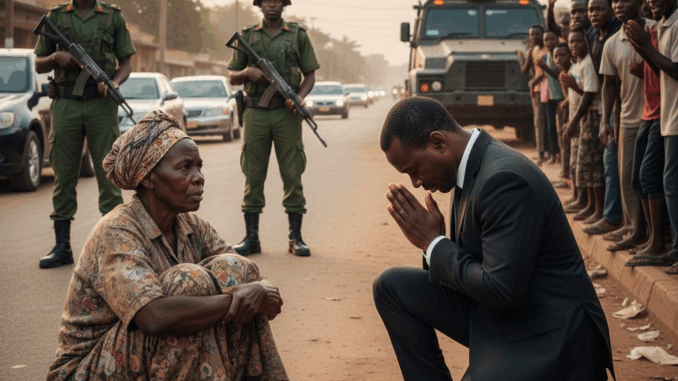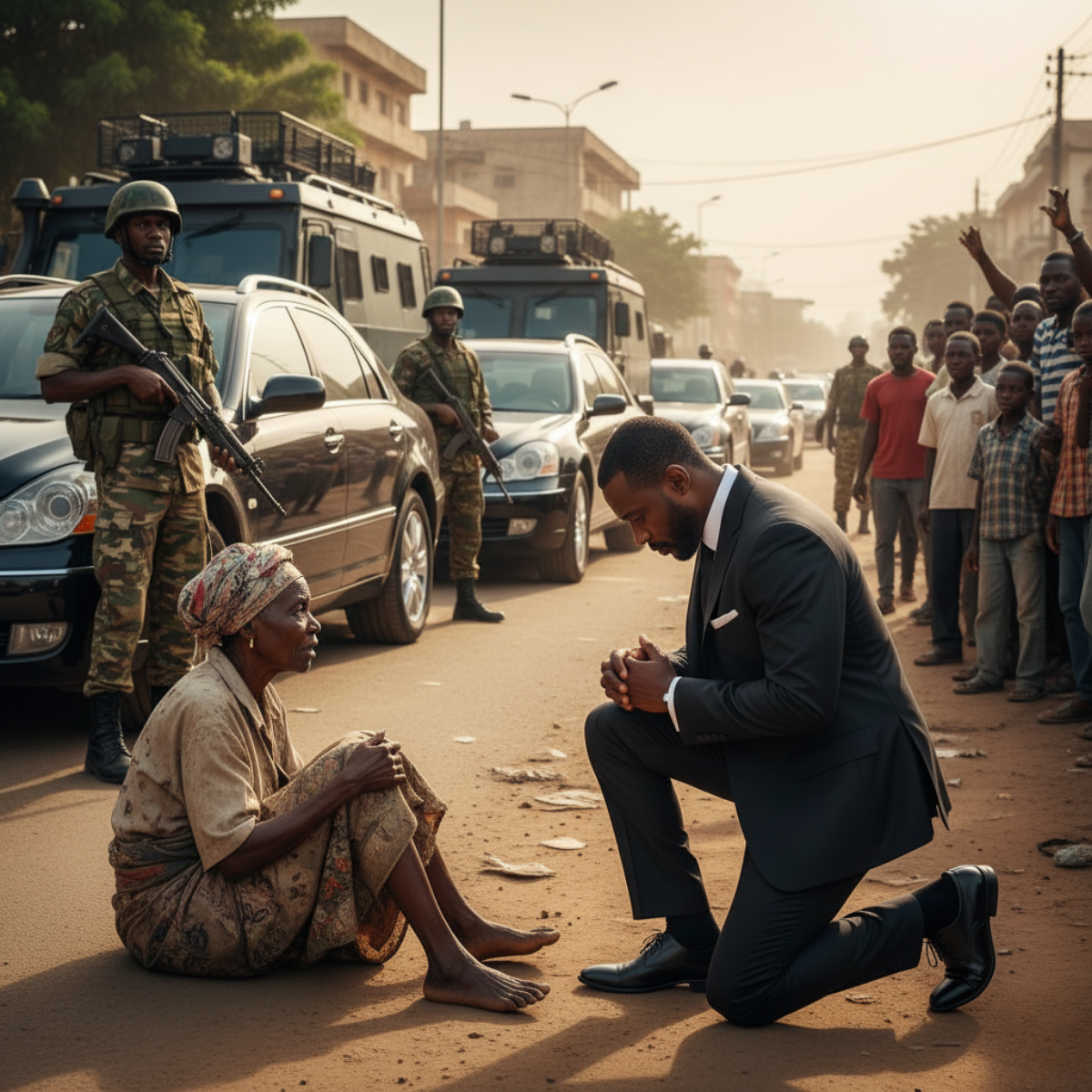

The rain had fallen all afternoon, merciless and heavy, flooding the streets of the city until they looked more like rivers than roads. Thunder cracked like the sky itself was splitting apart, and the wipers on Grace’s car barely managed to clear her view. She was exhausted from a long day at the bank, and all she wanted was to reach home, close her door against the storm, and forget the chaos outside.
But fate has a way of changing lives when we least expect it.
As she turned down a narrow street, her headlights illuminated something strange near the edge of the flooded gutter. At first, it looked like a bundle of rags. But as the car drew closer, Grace’s heart clenched. It wasn’t rags. It was a boy.
He was lying half in the water, his clothes soaked, his body trembling violently in the cold. His eyes were only half open, his lips cracked and dry, his breathing shallow. He looked no older than fifteen. Grace slammed the brakes so hard that her car skidded in the water. Without thinking, she leapt into the storm, her heels splashing in the flood.
“Jesus Christ!” she cried, kneeling beside him. She touched his forehead and gasped. His skin burned with fever, but his body shook as though from ice. She tried to speak to him, but he barely responded, his head rolling weakly to the side.
He was seconds away from death.
With adrenaline she didn’t know she had, Grace wrapped her arms around the boy and lifted him from the ground. He was terrifyingly light, like a fragile bird, as though life itself had already begun to slip away. She staggered back to her car, placed him gently in the back seat, and sped through the rain to the nearest hospital.

The Forgotten Child
At the hospital, nurses rushed to take the boy from her arms. They disappeared behind the swinging doors of the emergency ward, leaving Grace standing in the hallway, soaked to the bone, her hands trembling and her heart pounding.
For hours she sat outside, whispering prayers she hadn’t spoken in years. When at last the doctor emerged, his face was lined with disbelief.
“This boy,” he said slowly, “should not be alive. Severe malaria, pneumonia, and dangerous malnutrition. It’s a miracle he even made it here.”
Grace’s lips trembled. “Will he survive?”
The doctor hesitated, then nodded. “With proper care, yes. But he will need someone to stay by his side. He cannot return to the streets.”
It was then that she learned his name: Divine.
At only fifteen, Divine had endured more tragedy than most could imagine. His mother, a seamstress, had raised him with fierce love. She worked long hours, often sewing late into the night, to provide for her only child. Divine knew no luxury, but he knew warmth and devotion.
Then one afternoon, tragedy struck. On her way to pick him up from school, his mother was killed in a car accident. The world Divine knew collapsed in a single instant.
Three months later, as he was still mourning, his relatives stripped away everything his mother had owned. They took her small house, her savings, even her personal belongings. Divine was left with nothing—not a roof, not food, not care. Abandoned, he wandered the streets. Hunger gnawed at him daily. Loneliness weighed heavier than any hunger. And when sickness finally overwhelmed him, he collapsed by the gutter where Grace found him.
A Flicker of Trust
Divine’s recovery was slow. For days he drifted between fever and sleep. Grace visited daily, bringing food, clean clothes, and small comforts. At first he did not speak much. His eyes, dark and hollow, carried the weight of grief and betrayal.
One evening, as she sat by his bed, he whispered hoarsely, “Why did you stop? Others saw me… but no one stopped.”
Grace looked at him and felt tears sting her eyes. “Because no one deserves to die alone in the rain. Not you, Divine.”
It was the first time he allowed himself to cry since his mother’s funeral.
Little by little, he began to trust her. He told her about the nights he slept under shop awnings, about the hunger that twisted his stomach, about the memory of his mother’s laughter. Grace listened, never interrupting, never judging.
A Second Chance
When the hospital finally discharged Divine, Grace faced a choice. She could walk away, convincing herself she had done enough. Or she could step further into his life.
She chose the latter.
She brought him into her small apartment, bought him clothes, and enrolled him in school. At first, the arrangement was difficult. Neighbors whispered. Colleagues raised eyebrows. Why would a young banker take in a homeless boy? But Grace ignored the questions. She saw in Divine not just a boy, but a life worth saving.
Slowly, Divine flourished. He attacked his studies with determination, driven by the memory of his mother and the knowledge that someone had given him a second chance. He was quiet but resilient, scarred but strong.
Grace often marveled at his transformation. She would come home after work to find him at the table, his books spread out, his pen moving furiously. Sometimes he would fall asleep on the couch, a textbook still in his lap, the faintest smile on his lips.
Years Later
Time passed, and Divine grew into a young man with dreams larger than the pain of his past. He earned top grades, catching the attention of teachers and community leaders. Eventually, he won a scholarship to study medicine.
On the day he received his acceptance letter, he placed it gently in Grace’s hands. “You saved me,” he said, his voice thick with emotion. “One day, I’ll save others the way you saved me.”
Grace hugged him tightly, tears streaming down her face. For her, that stormy afternoon was no longer a curse—it was the moment her life gained new meaning.
The Lesson
The story of Grace and Divine spread far beyond their city. Newspapers picked it up. Churches spoke about it in sermons. People repeated it as a reminder that compassion, even in its simplest form, can transform lives.
And Grace herself learned something she had never understood before: sometimes the greatest investments we make are not in stocks or savings accounts, but in people.
Whenever she drove past that bend in the road where she had first seen Divine, she slowed her car and glanced at the gutter. Not with horror this time, but with gratitude. Gratitude that she had stopped, gratitude that he had survived, and gratitude that their lives had found each other in the storm.
Because sometimes the rain does not wash life away. Sometimes, it brings two souls together—one broken, one searching—and creates a bond that neither storm nor time can destroy.
Để lại một phản hồi